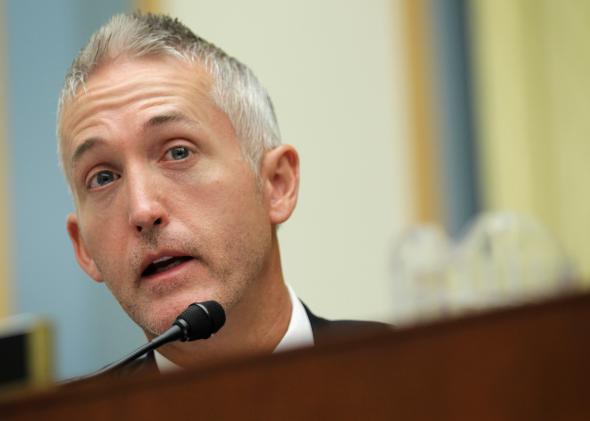How the First Benghazi Committee Hearing Humbled the Hillary Clinton State Department

Photo by Alex Wong/Getty Images
The reporter who walked into this morning's first public meeting of the House Special Committee on Benghazi saw something shocking and unforeseeable: empty chairs. Staffers had given the media a couple of dozen chairs on both sides of HVC-210, one of the more accessible rooms in Congress, but there was no queue to see the hearing and no great bustle among the press. Halfway through the hearing, one reporter packed up and left. A careful eye, scanning the room, could see more than a few people yawning or waging unsuccessful battles against their heavy eyelids.
This was sort of the point. South Carolina Rep. Trey Gowdy had made the first public meeting focus on one of the least juicy aspects of the Benghazi story: "Implementation of the Accountabilty Review Board recommendations." Rather than handing Hillary Clinton a subpoena, rather than airing new accusations from the "scapegoated" whistleblower Raymond Maxwell, Gowdy was going to focus on the issue Democrats always brought up first, the one that sounded like a dodge.
Remember when Hillary Clinton blew up at Wisconsin Sen. Ron Johnson's questions about Susan Rice's talking points and asked, "What difference, at this point, does it make?"? Her point was that the government should focus on preventing future Benghazis. That seemed to be the point Gowdy, his Republican colleagues, and the minority Democrats agreed on.
The result was two hours of slow-building arguments about whether the State Department's crowded org chart prevented quick action or accountability when it came to diplomatic safety. Only after that did Gowdy take back the mic and set a trap for Gregory Starr, the assistant secretary of state for diplomatic security who worked briefly under Hillary Clinton and returned to State last year. Gowdy read from an unnamed document full of promises to fix up embassy security.
" 'We praise the ambassador for seeking security enhancements long before the attack,' " said Gowdy. "Do you know what that's from?"
"I believe it’s part of the ARB report," said Starr.
"From nineteen-ninety-nine," said Gowdy, drawing out each number.
Starr cheerfully tried to recover from Gowdy's throat-punch. "After Nairobi, correct?" he asked.
Gowdy moved on. "That was the ARB from 1999, and you can lay it almost perfectly on Benghazi," he said. "They were disappointed that the recommendations after the bombing in Beirut were not implemented."
The Republicans on the panel, from ambitious Kansas Rep. Mike Pompeo to the ever-shirtsleeved Ohio Rep. Jim Jordan, did not manage to hide their grins as Gowdy dug into the 1999 report.
"'The Secretary of State should personally review the security situation of diplomatic facilities, closing those which are threatened,' " said Gowdy, quoting the report. "Why do you think the 1999 ARB went out of its way to use the word personally?"
Starr paused. "No comment, sir," he said.
Gowdy was temporarily stunned. "Is the answer privileged?" he asked. "That’s a recommendation from the 1999 ARB. The secretary of state should personally review. I’m asking you, with all due respect—we’re not going to get to the word review. We’ve got to get past the word which modifies review, which is personally."
Starr had an answer, finally. "I think ultimately the secretary, who bears responsibility, has to be brought the information necessary for him to make decisions," he said. "That is my job."
Starr went over a few ways that staffers needed to, and did, keep the secretary abreast of security issues. "Your answer mirrors what the 1999 ARB further said," countered Gowdy, "which is first and foremost that the secretary of state should take a personal and active role in carrying out the responsibility of securing the safety of U.S. personnel. Is that being done now, and was it being done prior to your tenure?"
"I have heard every secretary talk about the importance of security," said Starr. "I have heard every secretary state the personnel department that security is their function. That goes for Secretary Albright, Secretary Clinton, Secretary Rice."
Not good enough. "I think words have consequences, and they have meaning, and that people use words intentionally," said Gowdy. "A personal review is not simply talking about it."
Gowdy was hanging Hillary Clinton with Starr's own words. In another context, Democrats might have suggested he was hanging all those other people, included two of George W. Bush's secretaries of state, who presided over attacks on embassies. But ranking member Rep. Elijah Cummings and other Democrats stuck to sober promises that Congress wanted to prevent future disasters. They addressed some of those remarks to tourists, who'd shown up to see in person the drama that could decide who wins the next presidential election.

